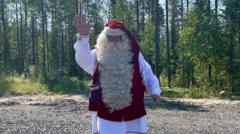Lapland's seasonal charm is being challenged as record-breaking heatwaves envelop the Arctic region, raising concerns for Santa Claus, local wildlife, and climate conditions.
Santa is adjusting his operations in Rovaniemi, advising his team of elves to stay hydrated amidst an unprecedented heatwave that has seen temperatures exceeding 30C for several consecutive days. “I’ll only venture outside after 6 PM for a swim when it’s cooler,” he said, donning his heavy red costume.
As the Finnish Meteorological Institute reported, the current heatwave has persisted since mid-July, marking the longest in Lapland's history, exceeding records maintained since 1972. Meteorologist Jaakko Savela noted the exceptional nature of this summer spell where temperatures reached 31.7C at multiple locations, around 10C above the seasonal average.
Scientists attribute rising temperatures in the Arctic region to climate change effects, despite confirming this particular heatwave can’t be directly linked to it. “Without climate change, temperatures over the last two weeks would have been lower,” Savela explained. Jeff Weller of the University of Oulu emphasized that increasingly extreme weather patterns worldwide are being shaped by climate shifts.
The ongoing heatwave poses a greater risk to regional flora and fauna, particularly the reindeer, whose populations are now being driven to roads and urban areas for relief from mosquitoes. In future scenarios of escalating heat events, reindeer herders may have to construct shaded shelters to protect their animals.
Tourists flocking to Lapland, traditionally celebrated for its cool climate, are now experiencing unexpected discomfort. Visitors like Silvia from Prague lament, “I packed wrong outfits expecting a cooler climate,” while London resident Adita shares similar sentiments, expressing surprise at the heat in what is meant to be a winter paradise.
With hours of daylight extending up to 20 hours, Lapland's summer sun exacerbates conditions, frustrating visitors and locals alike. Elf Elina, working at Santa's post office, expressed her concerns about the potential loss of traditional winter conditions, questioning whether heatwaves could now become a new norm.
“For now, I manage my heavy costume by limiting outdoor activities to the evenings, as prolonged exposure could lead to heat-related illnesses,” Santa remarked. He still holds onto the nostalgic vision of snowy winters. “A hot summer might be enjoyable for some, but I, like many here, long for the cold and snow.”
Santa is adjusting his operations in Rovaniemi, advising his team of elves to stay hydrated amidst an unprecedented heatwave that has seen temperatures exceeding 30C for several consecutive days. “I’ll only venture outside after 6 PM for a swim when it’s cooler,” he said, donning his heavy red costume.
As the Finnish Meteorological Institute reported, the current heatwave has persisted since mid-July, marking the longest in Lapland's history, exceeding records maintained since 1972. Meteorologist Jaakko Savela noted the exceptional nature of this summer spell where temperatures reached 31.7C at multiple locations, around 10C above the seasonal average.
Scientists attribute rising temperatures in the Arctic region to climate change effects, despite confirming this particular heatwave can’t be directly linked to it. “Without climate change, temperatures over the last two weeks would have been lower,” Savela explained. Jeff Weller of the University of Oulu emphasized that increasingly extreme weather patterns worldwide are being shaped by climate shifts.
The ongoing heatwave poses a greater risk to regional flora and fauna, particularly the reindeer, whose populations are now being driven to roads and urban areas for relief from mosquitoes. In future scenarios of escalating heat events, reindeer herders may have to construct shaded shelters to protect their animals.
Tourists flocking to Lapland, traditionally celebrated for its cool climate, are now experiencing unexpected discomfort. Visitors like Silvia from Prague lament, “I packed wrong outfits expecting a cooler climate,” while London resident Adita shares similar sentiments, expressing surprise at the heat in what is meant to be a winter paradise.
With hours of daylight extending up to 20 hours, Lapland's summer sun exacerbates conditions, frustrating visitors and locals alike. Elf Elina, working at Santa's post office, expressed her concerns about the potential loss of traditional winter conditions, questioning whether heatwaves could now become a new norm.
“For now, I manage my heavy costume by limiting outdoor activities to the evenings, as prolonged exposure could lead to heat-related illnesses,” Santa remarked. He still holds onto the nostalgic vision of snowy winters. “A hot summer might be enjoyable for some, but I, like many here, long for the cold and snow.”



















